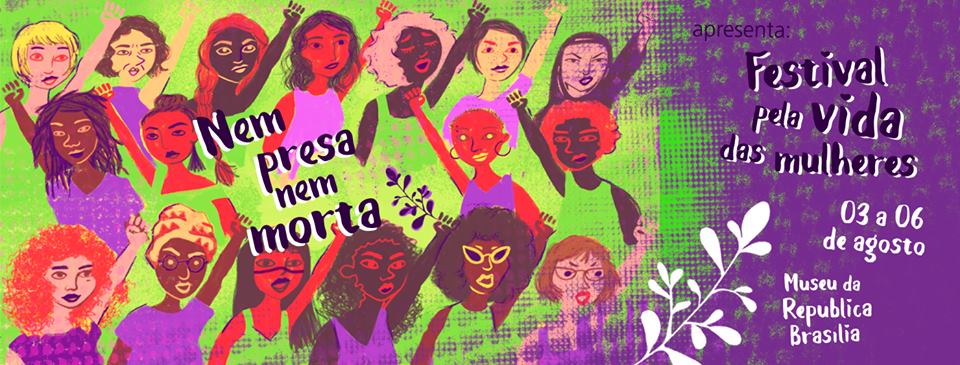
By Angela Freitas
Feminists, networks and organizations engaged in the struggle for the right to abortion in Brazil had two months to prepare a mobilization and communication strategy around the Supreme Court public hearing on ADPF 442 on August 3 and 6. This way, the campaign #NeitherKilledNorJailed was thought of, to resound on social media in order to widen the abortion debate scope beyond the Court’s walls into society.
The campaign was launched on July 19 on Facebook, Twitter and Instagram announcing “the historical chance for all to walk together to change women’s lives forever!”. If approved, ADPF 442 would allow for voluntary terminations to be performed up until week 12 pregnancy without criminalizing women and abortion providers. A token was chosen, the rue, a plant to whom has attributed effects of repealing evil and also of aborting.
The National Front Against Women’s Criminalization and For Abortion Legalization (created in 2007) proposed the Women’s Lives Festival under this context, involving activist for the right to abortion across Brazilian states, who arrived in caravans to the country’s capital, where the public hearing took place. In Brasília, the Festival was installed at the National Museum gardens, a few kilometers from the Supreme Court, while the Facebook page #NeitherKilledNorJailed was the Festival’s official channel.
Delegations of 400 women from Rio de Janeiro, São Paulo, Belo Horizonte, Goiânia and Espírito Santo traveled in freighted buses, camped and stayed in hostels. Six thousand women were estimated in total throughout the event. Most of them were young women, but the Festival, however, draw a diversity of activists, from different generations, who felt emotional when arriving at the site and found all the spectacle of watching together, all six thousand of us, the live transmission of the hearing.
In the breaks half-times, all sorts of activities — group conversations, shelter centers, workshops, cultural and artistic manifestations — was managed by the Federal District Women’s Forum. Its activists were relentless in securing all structure for the event in record time, the concert stage, the six different activities tents, and also facilities such as daycares, bathrooms, meals, water and efficient security scheme.
On August 6, the schedule ended at 5 am, at the Supreme Court’s doors, with the Inter-Religious Act For Women’s Lives, a moment of harmonization and concentration in order to occupy the plenary and watch the second hearing day. A group of activists was already since 1 am, saving us a place in the line to secure a good number of feminists would make it into the hearing room and represent the plenary majority. All were connected and articulated through whatsapp.
The Festival satellite activities were registered in twenty diferente locations across the country (four cities and fifteen capitals). Many of these events stratched until August 8, in order to support the Argentinian abortion bill vote on the Senate.
A communication success
The communication group worked tirelessly. The Twitter page @DireitoAoAborto (righ to abortion) registered to live the Supreme Court hearing sessions, announcing the pro-choice speakers, their key arguments and fact-checking the “pro-life” numbers and figures. The hashtag #NeitherKilledNorJailed reached the #5 world’s Twitter trending topic, while the twitter page caused 855 thousand reactions, 8,300 likes, 1,800 followers, 4,200 retweets in just 12 days.
This was the most successful tweet:
“Women who abort are mostly young, have children and follow a religion. We want them and all women to not risk being jailed or die from unsafe abortions. #Let’sGoTogether #NeitherKilledNorJailed #ADPF442 #NotOneLess”
A study published by Getúlio Vargas Foundation showed that, from 2pm of Thursday (08/02), the day before the hearing, until 2 pm of Mondayn (08/06) the debate on abortion on Twitter generated 711,800 social media posts. The most used hashtag at that period — “AbortionIsCrime — was cited in over 199 thousand mentions, which comprised 28 per cent of all tweets. The second and thirs most cited #NeitherKilledNorJailed (9 per cent) and #LegalizeAbortion (6 per cent), were able to mobilize together around 106 thousand mentions. Users favourable to abortion decriminalization were responsible for 68 per cent of all people who engaged in the theme. Twelve pices in the general press resounded the abortion debate on Twitter using the hashtag #NeitherKilledNorJailed.
Live streaming from Brasilian, the Facebook and Instagram Campaing pages also mobilized thousand of followers. Videos extracted from the the public hearing webcast were edited for sharing on social media and WhatsApp. Published on Quebrando o Tabu page, the three first vídeos reached two million views and fifty thousand shares.
A posterior analysis of the media coverage on the Festival revealed 469 pieces were publiched on ADPF 442 or on abortion. The content significant majority published was either in favour or neutral to the proposition. The two main newspapers also brought editorials on the claim. O Globo defended the decriminalization whilst Folha de São Paulo proposed a referendum. And the Pernambuco Diary, a major circulation newspaper in the Northeast region, published a favourable editorial on the last day of the public hearing.
